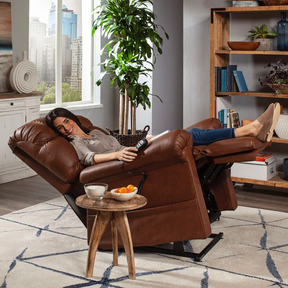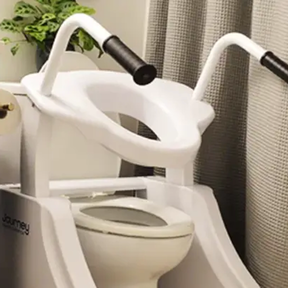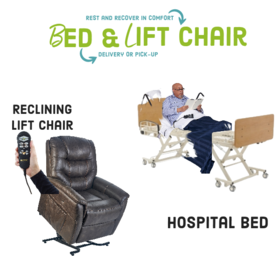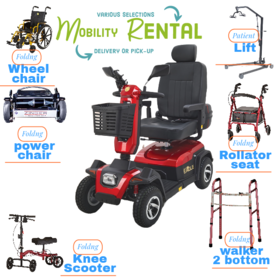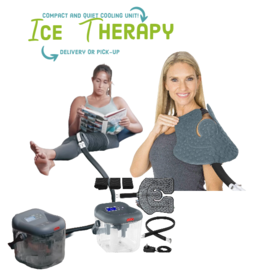Blog Buying or Renting a Medical Device
Thu, 01/17/2019 - 10:42

Technology is rapidly changing our world and will continue to do so in years to come. The medical industry is no different and has seen remarkable advancement in the last few decades.
The healthcare industry today is massively reliant on medical devices, and ensuring our well-being is unimaginable without these devices. Whenever a new upgrade of a device is available (which has been very often), it must be acquired to ensure seamless safety and well-being.
If you are unsure about whether to buy or rent the medical device you need, there are several factors you might want to consider before having the solution.
There is no universal answer to this “renting or buying medical device" debate that does the job for everyone. The resolution of this dilemma is dependent on critically examining the below factors.
Things To Consider Before Deciding to Rent Or Purchase an electric medical

wheelchair:
Some factors that cannot be ignored while deciding to rent or purchase medical equipment are:
- Nature and Age of Your Business
- Price Analysis
- Maintenance Costs (Short-Term and Long-Term)
- Tax Analysis
- Technology and Capability of the Device
- Length of the Project/Job
- Upgrade History of the Device
Nature and Age of Your Business:
The nature, size, and age of the business that wants to attain a medical device are very important factors in whether it should rent or purchase the machine. For example, for a Day Care Treatment Centre, an OPD, a small hospital, or an Urgent Care Centre, a startup, or with limited working capital buying large-scale medical equipment is pretty unrealistic. This is not a theory at all. It can be evaluated based on the average medical device prices. For instance, an average Power Chair costs around 2,000 USD and can go up to 20,000 USD depending on the functions and utility it provides, an average X-Ray Machine costs over 100,000 USD, and an average CT Scan Machine costs over 200,000 USD.
A brief version of the long story: If you have sound working capital, you can consider purchasing medical devices per your need. For starters, with limited means and a small-scale business, it is better to go for renting the device.
Price Analysis of electric wheelchair:
You can buy or rent a medical device, but what if it is more cost-effective in one of those ways? When deciding whether to rent equipment or buy your own, weigh the pros and cons of both options.
For instance, there are offers that if you buy a device upfront, you might get a hefty discount.
In some cases of renting a device, you end up paying more than the actual cost of the device in the form of monthly rent installments.
The same analysis should be done while taking out a medical device loan. In a loan, your credit score determines the interest rate you will be entitled to pay. Heavy interest rates will be implemented for people with bad credit (low credit scores), while people with decent credit scores get lower interest rates on their loans.
The above scenarios are for clarity only. All these prices may vary from case to case.
Maintenance Costs (Short-Term and Long-Term):
Along with the medical equipment's price, a few operational and maintenance costs are involved. These costs can be both short-term as well as long-term.
Before breaking the bank and buying that shiny medical device you always wanted to have, you might want to consider some short-term and long-term maintenance costs. Some of these include:
- What will be the cost of employing a person to operate the device?
- How much will its service and maintenance cost, and how often will that be?
- Would you need an agency for its service and maintenance? How much will that cost?
- Electrical and other such expenses to operate the medical device.
Hence, it might be ideal to have equipment on rent to avoid disturbing your cash flow even when you can afford to buy it. A device's possible maintenance and service costs must be well-researched because they are essential to operate your medical equipment effectively.
Tax Analysis:
For eligible business equipment, businesses can deduct the entire purchase amount from their taxes under Section 179 of the Tax Code. Some expenses can be written off, such as crutches, back support, and a wheelchair.
Small, monthly payments on equipment leases are cheaper than a single purchase payment for medical institutions and may also provide tax benefits. Leasing payments can be deducted from the income of medical clinics and hospitals, so you may spend less than you expected while still having access to cutting-edge medical technology.
Technology and Capability of the electric wheelchair:
Another very important factor to consider before buying or renting a medical device is its technology. It is common in the industry that an updated and better version of medical devices is released every year or two. Not just in the healthcare industry, technological advancement has been very rapid in all sectors lately. A great example of this is Mobile Phones. Every year, we see a new model with advanced and improved features and specifications.
Before buying equipment for your medical requirements, do basic research on the device. For example, you might want to ensure that this company is not launching any improved device version in the coming months. If that is the case, the best scenario would be to rent the device for the time being and then replace it with the improved version when it is available for sale rather than end up with its obsolete version.
Another aspect of the technological evolution that should be considered is that prices of older devices drop reasonably when their advanced version is released. If the upgrade is just minor and you are good with the older version, you can get your desired medical device at a lower price.
Length of the Project/Job:
This is important to remember, especially while weighing the pros and cons of renting versus purchasing large medical equipment. For a one-time endeavor or a short-term project, renting is more cost-effective. However, there's a chance you'll lose money if the job is delayed or rescheduled unexpectedly. Rental costs can add up quickly for projects that last a long period, so buying the equipment is the best option.
The new equipment must be weighed against the benefits to your practice. Is it worth it? If so, how much money can you save by doing so? Is it going to aid you in your current practice? Is it going to help in your efforts to bring in new clients? You should buy it if the answer is yes because it's well worth the money. Otherwise, you'll end yourself paying for resources you don't use.
Upgrade History of the Device:
Renting is a smart option if the medical equipment you want doesn't need to be regularly upgraded. Some devices must be periodically rotated and replaced with newer technology, but others remain constant over time.
You can choose the purchase option for devices that are not upgraded often.
You can choose the rent option for the devices linked with constantly upgraded technology.
Once again, you might want to consider price and purchasing power before deciding.
Buying versus Renting Equipment:
Depending on the above factors, buying or renting a medical device can be a good choice either way. Both options have their advantages and reasons for you to choose them. Let's summarize everything discussed regarding the two options for acquiring medical equipment:
Buying:
- Equipment ownership at all times.
- Cost-effective in the long run
- Likely tax compensations.
- Confirm return on investment.
- Minimizes downtime.
Renting:
- A` lower initial outlay of cash
- A wide range of devices is available for use.
- Availability of the most recent technology
- No reason to deal with insurance, service, maintenance costs, etc.
Conclusion:
When delivering high-quality healthcare, choosing the correct equipment is critical. Likewise, for a business to keep running smoothly, it is important to make wise, calculated, and effective decisions.
Patients aren't going to judge your facility based on whether or not you own or rent the equipment; all that matters is that it works properly and gives them the greatest possible treatment. The decision to buy or rent your next medical device is yours. But how efficient and resourceful it would be, depends on exploring the above factors and choosing the most suitable option per your business need and state.
Medical equipment can be purchased or rented, and both options have pros and cons. There's no right or wrong answer; it all comes down to the user's budget.
Tags
- contest
- event
- supplies
- design
- brand
- video
- Compression
- upright walker
- four wheel walker
- rollator
- wheelchair
- Ostomy
- elegantly
- elegantly
- accessibility
- Mobility
- knee walker rental
- knee scooter sales
- knee scooter
- post operative shoe
- anti-embolic stockings
- pain management
- cryotherapy therapy
- hot cold compress
- compression stockings
- lift chair
- wound Care
- air purifier
- fall prevention
- cushion
- oxygen therapy
- cpap, bipap
- Hospital Bed
- Life Aide
- EMS
- recovery
- splint
- knee brace
- Bathroom
- patient lift
- medical supply
- Wound dressings
- Lightweight Wheelchair
- hospital beds for sale
- sky medical supplies rentals
- compression socks
- Tegaderm Dressing
- Adult Diapers
- Rollator Walker
- Bed Wedge Pillow
- Hospital beds
- Patient Lifts and Slings
- Portable Oxygen Concentrator
- Patient Lift Slings
- knee scooter rental
- folding mobility scooter
- mobility scooter
- medical shoes
- raised toilet seat
- hospital beds for rent
- lift chair recliner
- chair lift
- electric wheelchair
- Power Lift Recliners for Elderly
- Senior Walkers
- Bedside Commodes
- whill wheelchair
- compression hose
- Whill Electric Wheelchairs
- Bariatric Wheelchair
- Recliner Chairs with Lift
- Colostomy Bag
- Crutches
- Medical Wedge Pillow
- skin barrier tape
- Post Surgery Ice Machine
- Bedside Commode
- chair lift recliners
- cane holder scooter
- lift chair prices
- drop arm commode
- rollator walker with ergonomic seats
- Hospital Bed Rental
- Wheelchair Tray
- Golden Technologies Lift Chair
- Nova GetGo Junior Rollator
- power lift recliners
- Knee Scooters and Crutches:
- stand up walker for seniors
- stand up walker as seen on TV
- Women's Walking Canes
- Knee Immobilizers
- Bed Wedge Pillow
- Medical Supply Stores
- Sit to Stand Lifts
- Grab Bars
- Compression Gloves
- incontinence bed pads
- Lift Reclining Chair
- Knee Walker Scooters
- Hernia Belt Near You
- Mobility Scooter Stores Near Me
- Folding Knee Walker
- Oxygen Concentrator Store
- Inogen Battery
- Electric Bed Frames
Related Posts
Get weekly articles in your inbox on the latest medical supply news, exclusive deals, and helpful health tips.
Wed, 04/20/2022 - 03:32
how to fit for mobility – Height Adjustment Guide.
This article is a walker fitting guide that introduces the need for a walker and then focuses on the “Dos” and the “Donts” while trying to fit into a walker.
Sun, 10/23/2022 - 16:35
What Is the Average Life of a Mobility Scooter? Let us find out!
Just how long does the average mobility scooter last? With regular servicing, a mobility scooter can serve its owner decades after purchase.
